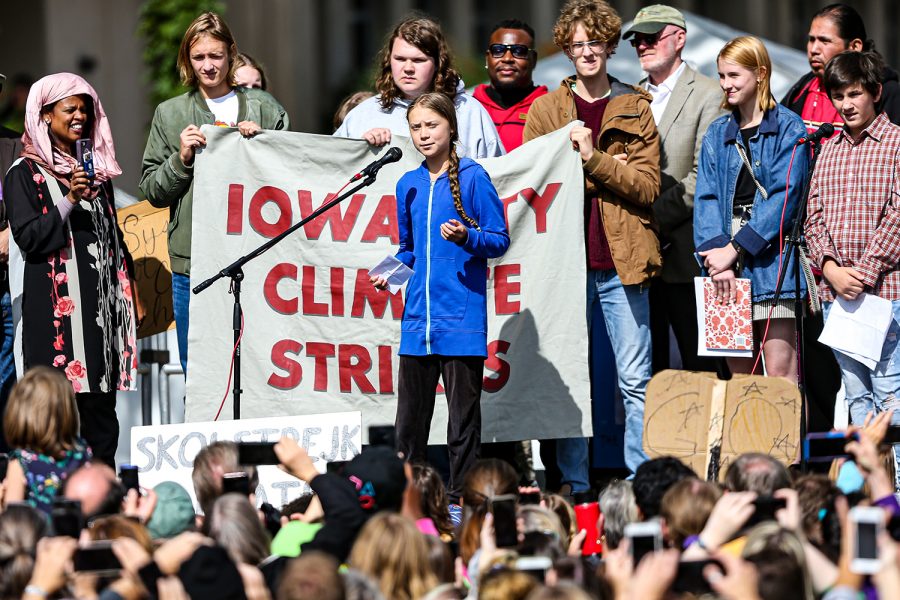Opinion: Young people must make climate action a political priority
Young Iowans need to continue the fight for environmental agendas now, not later.
Swedish climate activist Greta Thunberg speaks at the Iowa City Climate Strike in downtown Iowa City on Friday, Oct. 4, 2019.
February 3, 2020
We must have an environmentalist as our president-elect on Nov. 3.
There is no other issue on the progressive agenda that should be pursued with more urgency than climate change. This is both the foundation and the limit of our political future. Democratic and Republican Parties cannot debate or create legislation if there is no physically habitable place to govern.
Climate action has to be voters’ top priority in the 2020 election. By taking on the responsibility of environmental activism first, voters will then be able to focus on other issues on stable ground. We need to mentally equate Abraham Lincoln’s rhetoric of “a house divided cannot stand” with Swedish activist Greta Thunberg’s message, “Our house is on fire.”
Thunberg’s activism has become the image for climate action for the last year, and that image consists mostly of students — young voters. We are the key to prioritizing climate action.
While students are definitely conscious of climate activism, actually discussing its reality is almost never done within a classroom. This is an incredible mistake.
Our demographic is a valued target by all presidential campaigns. We have the potential of showing up to vote for a candidate in enormous numbers.
In the 2018 midterms, student-age voter turnout increased considerably in almost every state. These midterms showed that most young voters favored Democratic candidates. Support of a Democrat usually implies support of agendas dedicated to climate action, such as the Green New Deal.
With this kind of possible impact, one would think universities would take a student’s exercise of the right to vote as an opportunity to promote education. However, most educators are more than reluctant to vocalize anything to do with climate action.
To understand this space between young voters and the teachers, I talked with UI lecturer Michael Žmolek. He is actively dissolving this space by making environmental history and policies its own academic focus, and currently teaches a class on sustainability.
“The course is mainly about development theory, but our textbook problematizes development theory as that, until now, environment was never a central concern,” Žmolek said. “It does seem academia is beginning to internalize the problem, and adjusting to the idea that academia has a key role in finding solutions.”
Žmolek remarked on how enrollment for his sustainability class is higher this spring semester than ever before.
I asked him about his impression of educators being reluctant to broach the topic of climate action.
“We teach our students what is true versus what is false, not what political position to support,” he said.” This is tragic, because we have the facts, and the idea that there is still a debate as to whether climate change is happening is basically false. It is a false debate.”
This coming election cannot afford the time consumption of false debate. The majority of young student voters vocalize support for climate action, because they know the consequences.
We need to talk about that reality now.
Teachers need to acknowledge those consequences, and support a future for their students that’s realistic and livable.
“Educators should be preparing young people,” Žmolek said. “Time is increasingly a luxury.”
That preparation is informing students, so that their ballot can be used to elect politicians who will implement legislation that can literally save the world.



